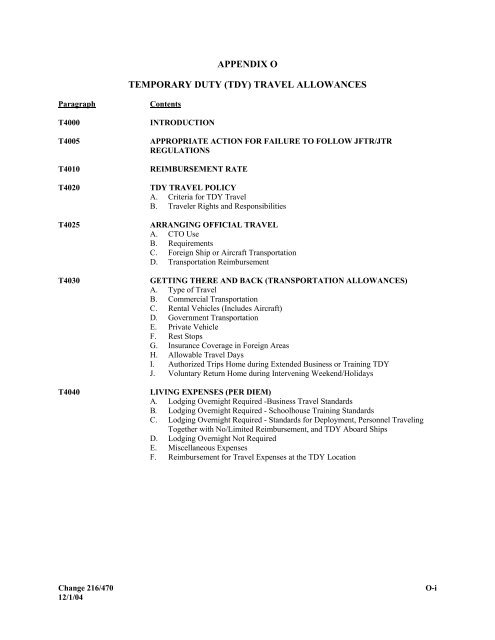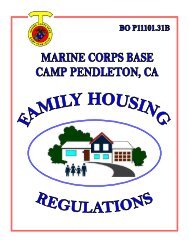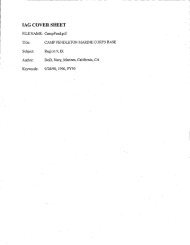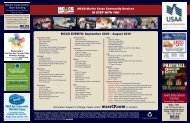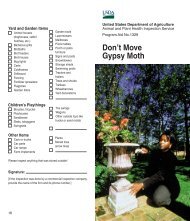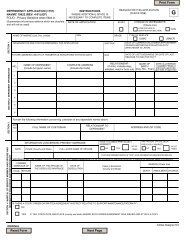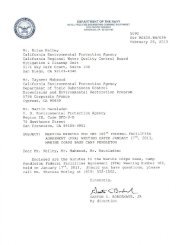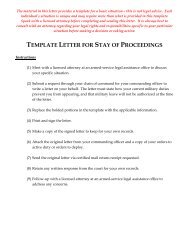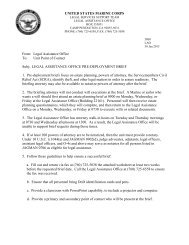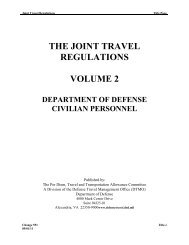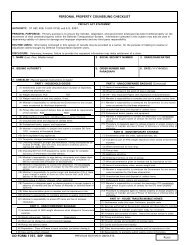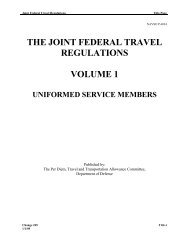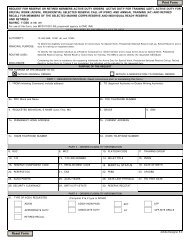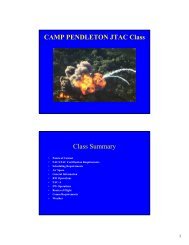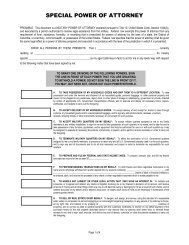TDY - Marine Corps Base Camp Pendleton
TDY - Marine Corps Base Camp Pendleton
TDY - Marine Corps Base Camp Pendleton
Create successful ePaper yourself
Turn your PDF publications into a flip-book with our unique Google optimized e-Paper software.
JFTR/JTRT4000Effective 3 June 2005*T4000 INTRODUCTIONAPPENDIX OTEMPORARY DUTY (<strong>TDY</strong>) TRAVEL ALLOWANCESThis Appendix describes the travel and transportation allowances and responsibilities of travelers who performthe most common <strong>TDY</strong> travel types as authorized by law for uniformed members and DoD civilian employees.It is authorized for use by the activities listed at the end of this Appendix, and under the conditions cited in,Joint Federal Travel Regulations, Volume 1 (JFTR), par. U1039, and Joint Travel Regulations, Volume 2(JTR), par. C1001-B. This Appendix covers individual travel for business, travel for schoolhouse training, anddeployment or personnel traveling together with or without no/limited reimbursement. The provisions in thisAppendix are to be used in place of <strong>TDY</strong> allowances in the JFTR and JTR (with exceptions and references asnoted herein), except that the provisions in JFTR, Chapter 7 for uniformed travelers and JTR, Chapter 6 forcivilian employees are to be used for travel of:1. Senior ROTC,2. Reserve Component Member travel for medical and dental care,3. Retirees called to active duty,4. Ready Reserve Component members authorized muster duty allowance,5. Midshipmen and cadets,6. Patients/for health care, and escorts and attendants,7. Pre-employment travel;8. When accompanying members of Congress and Congressional Staff;9. Employees with a disability when additional travel and transportation expenses are incurred;10. UN Peacekeeping;11. Prisoners and their guards or for disciplinary action; and12. for rules that apply when emergency situations occur while <strong>TDY</strong> is being performed.See JFTR, par. U7125-D for rules on per diem for uniformed members who are inpatients in a hospital. Fortravel of civilian consultants and experts, see JTR, par. C4975. <strong>TDY</strong> performed as part of a PCS movecontinues to be paid as prescribed for <strong>TDY</strong> travel in JFTR and JTR Chapters 4. Except where differences areidentified, the allowances and responsibilities in this Appendix apply equally to uniformed members and DoDcivilian employees. In this Appendix, "authorizing official" or "AO" means the individual who controls themission, authorizes the trip, and controls funds for <strong>TDY</strong> travel. Definitions specific to this Appendix are foundin par. T4070. The provisions of this Appendix must not be supplemented.NOTE: See JFTR/JTR, Appendix E for Invitational Travel Authorizations.Change 224/478 O-18/1/05
JFTR/JTRT4020(1) See JTR, par. C2000-A2c/JFTR, par. U2000-A2c for medical reasons, or(2) <strong>TDY</strong> mission timing requires premium-class. When premium-class <strong>TDY</strong> transportation isauthorized because the mission timing is “so urgent it cannot be postponed,” premium-class travelshould only by authorized to the <strong>TDY</strong> site. Coach-class accommodations use should be annotated onthe trip record and used for the return flight if the return flight is not critical and traveler can rest beforereporting back to work. See JFTR pars. U3125-B2a and U3125-B2b and JTR, pars. C2204-B2a andC2204-B2b.c. Must not use foreign flag transportation even if U.S. flag carrier fares are higher,d. Who use premium-class or a foreign flag transportation presumably at Government expense mustprovide adequate acceptable justification that meets the requirements of the JFTR/JTR to the AO forreimbursement, ande. Should contact the AO and CTO as soon as possible after personally making arrangements to get theTrip Record updated, and arrangements confirmed, and/or to get alternate arrangements.5. Travelers are advised, in advance, of their allowances, the arrangements made for them, probable expenses,and a good estimate of what they should be reimbursed.6. Travelers should have use of a Government-sponsored, contractor-issued travel charge card. The policiesand procedures for the Government travel charge card program (including central billing and unit cards) arefound in the DoD Financial Management Regulation (DoD 7000.14-R), Volume 9, "Travel Policy andProcedures."7. Travelers should turn in the expense report portion of the Trip Record and be paid every 30 days when the<strong>TDY</strong> is over 45 days. This ensures travelers are paid for expenses in about the same time as charge card billsare received.8. Travelers must comply with Federal and Departmental ethics rules when accepting travel benefits (i.e.,goods, services or payment) from non-Federal sources. For DoD personnel, see Joint Ethics Regulation, DoD5500.7-R, Chapter 4. For Coast Guard personnel, see COMDTINST M5370.8 (series). For NOAA <strong>Corps</strong>personnel, see Department of Commerce Administrative Order 202-735. For Public Health Service personnel,see Commissioned <strong>Corps</strong> Personnel Manual CC26.1, Inst 1. Travelers may keep items of nominal value (asdefined in applicable ethics regulations). Travelers also may keep benefits received for voluntarily vacating aseat on an overbooked flight, but are not to vacate their seats if the Government would incur additional costs orif it would affect the mission.9. Retaining Promotional Itemsa. A traveler on official business traveling at Government expense on the funds of an agency (Seedefinition in Appendix A) may keep promotional material (including frequent traveler benefits such aspoints or miles, upgrades, or access to carrier clubs or facilities) for personal use. This applies topromotional items received before, on, or after 31 December 2001.Change 224/478 O-38/1/05
JFTR/JTRT4025b. The promotional material must be obtained under the same terms as those offered to the general publicand must be at no additional Government cost.c. Promotional items received for travel using funds other than those of an agency are not covered by thisrule. Travelers should seek guidance from those funding authorities.10. Travelers must be treated as honest, responsible customers, but they must follow the rules in this regulation.The DoD Financial Management Regulation (DoDFMR), Volume 9, JFTR, par. U2505, and JTR, par. C1305,apply when a fraudulent claim submission is suspected.T4025 ARRANGING OFFICIAL TRAVELA. CTO Use1. Mandatory Policy. It is DoD mandatory policy that travelers use available CTOs to arrange official travel,including transportation and rental cars.2. Service Regulations. See DoD component/Service regulations for CTO use information.3. Failure to Follow Regulationsa. Commands/units are expected to take appropriate disciplinary action when travelers and/or AOs fail tofollow the regulations concerning CTO use (see par. T4005).b. Disciplinary action should be for willful violations and may be in the form of counseling (oral/written),or non-judicial action (uniformed personnel), or other personnel means (civilian employees). Action mustnot be through refusal to reimburse. See par. T4025-A4 below for exceptions when reimbursement is notallowed.4. Reimbursement Not Allowed. Reimbursement Is not allowed when the traveler does not follow theregulations for foreign flag carriers (see par. T4025-C).B. Requirements1. When making travel arrangements, travelers should use the following:a. Services available under a TMS (see Appendix A), orb. In-house travel offices.Effective 1 September 20042. All travel arrangements must be made in accordance with:a. DoDD 4500.9 (Transportation and Traffic Management) athttp://www.dtic.mil/whs/directives/corres/html/45009.htm;b. DoDI 4500.42 (DoD Passenger Transportation Reservation and Ticketing Services) athttp://www.dtic.mil/whs/directives/corres/html/450042.htm; andChange 224/478 O-48/1/05
JFTR/JTRT4030c. Service regulations.*C. Foreign Ship or Aircraft Transportation. Transportation on foreign ships or aircraft of foreign registry must notbe authorized/approved unless the conditions in par. T4060-B3 are met (see also JFTR, par. U3125-C and JTR, par.C2204-C).D. Transportation Reimbursement1. CTO Available. When a CTO is available but the traveler arranges transportation through a non-contracttravel agent or common carrier direct purchase, reimbursement is limited to the amount the Government wouldhave paid if the arrangements had been made directly through a CTO.2. CTO Not Available. When the AO certifies that a CTO was/is not available to arrange transportation,reimbursement is paid for the actual cost of the authorized or approved transportation NTE the least expensiveunrestricted commercial coach fare that meets mission requirements.T4030 GETTING THERE AND BACK (TRANSPORTATION ALLOWANCES)A. Type of Travel. The AO may direct travel by any mode (e.g., Government or commercial air, bus, train) exceptthe AO cannot require the traveler to use a personal or rental vehicle for official travel. If a certain mode is directedand another mode is used, the traveler may only receive transportation reimbursement up to the directedtransportation mode cost.Effective 27 April 2005B. Commercial Transportation. The Services must require that CTOs arrange commercial transportation inaccordance with law, Government policies, agreements and contracted rates using American flag carriers and coachclassaccommodations whenever possible. The AO may, under certain conditions, authorize the CTO to arrangeother than contract city-pair flights, or to arrange foreign flag carriers, or business- (but not first-) -classaccommodations (see JTR, par. C1060, NOTE 1 and JFTR, par. U4326, NOTE 1) when needed to fulfill adocumented mission requirement as specified in par. T4060-B1. Only the officials listed in JTR, pars. C2204-B2and C2208-C (trains only) and JFTR, pars. U3125-B2 and U3135-C (trains only) may authorize business- or firstclassaccommodations use.Effective 28 Apr 05C. Rental Vehicles (Includes Aircraft). When rental vehicle use is authorized for official business by the AO,reimbursement is authorized for the rental costs, taxes and local assessments on rental vehicle users, necessary gasand oil, landing and tie-down fees, and transportation to and from the rental facility (see JFTR, par. U1410 and JTRpar. C1410). The following expenses are also reimbursable: parking; ferry fares; bridge, road and tunnel tolls;traveler access fee (when charged); any per-day administrative fee called for in the SDDC rental car agreements;garage, hangar or boathouse rental; subsistence of operator; and optional extra collision hull insurance for rentalaircraft. When possible, the CTO, per TRANSCOM policy, reserves a rental vehicle from a company thatsubscribes to the SDDC rental car agreement. Travelers are not reimbursed for rental car insurance coveragepurchased in the United States or its territories and possessions regardless of the vendor from whom the rentalcar is rented. Travelers are reimbursed for mandatory rental car insurance coverage required in foreign countries.When a compact rental car (the "standard" for <strong>TDY</strong> travel), does not meet requirements, the AO may authorize thesize vehicle appropriate to the mission. Claims for damage to rental vehicles, while the vehicles are being used forofficial business, are reimbursable to the traveler or the rental car company, as appropriate, as miscellaneoustransportation expenses if adjudicated as payable under the procedures set forth in the DoD Financial ManagementRegulation (Volume 9, Chapter 4) (found at website http://www.dtic.mil/comptroller/fmr/) (or appropriate Servicedirectives for the non-DoD Services). Reimbursement for personal funds for damage sustained by a rentedautomobile while being used on other than official business is not authorized.Change 224/478 O-58/1/05
JFTR/JTRT4030Effective 28 April 2005D. Government Transportation1. The TO arranges international Government airlift under AMC contract/control, when it is available andsatisfies mission requirements.2. The TO provides Government ground transportation. (Within the Navy, Government vehicles are obtaineddirectly from the providers, ordinarily Public Works.) Only use Government transportation for official businessto go to and from: the <strong>TDY</strong> location, where the traveler is staying, places to eat, and other places for comfortand health reasons. If it is used for any other purpose and the traveler has an accident, the traveler may have tocover the expenses and liabilities. Use Government servicing for the vehicle whenever possible. WhenGovernment servicing is not available, the AO may authorize reimbursement of actual vehicle operatingexpenses. These expenses include: gas and oil; parking fees; repairs; ferry fares; bridge, road or tunnel tolls;trip insurance for travel in foreign countries; guards; and storage fees.E. Private Vehicle. When a private vehicle use is approved by the AO as the best way for travel to be performed,reimbursement is authorized at the standard rate per mile for the type of vehicle and the distance between dutylocations or between home and <strong>TDY</strong> location(s). Reimbursement of parking fees, ferry fares, road, bridge andtunnel tolls for travel over a direct route is authorized. If the AO does not approve using a private vehicle and one isused anyway, reimbursement is authorized at the standard rate per mile plus reimbursable expenses but the amountis limited to the should-cost estimate of AO-approved transportation. In either case, reimbursement is onlyauthorized for the driver. If reimbursement at the published rate does not cover expenses, or if there is noestablished rate for the type of vehicle being used, the AO may authorize reimbursement of necessary transportationcosts incurred for uniformed personnel. For distance determination see JFTR, par. U2020 or JTR, par. C1065(DTOD requirements).F. Rest Stops. Normally, travelers are not required to travel during unreasonable hours at night. If the traveler isrequired to travel during normal sleeping hours, or the scheduled flight time including stopovers and plane changesexceeds 14 hours and the traveler is not authorized first/business-class accommodations, the AO may authorize arest stop en route or a rest period at the <strong>TDY</strong> location before reporting for duty. Scheduled flight time is the timebetween the scheduled aircraft departure from the airport serving the PDS/<strong>TDY</strong> point and the scheduled aircraftarrival at the airport serving the <strong>TDY</strong> point/PDS. Rest stops must not exceed 24 hours. NOTE: A traveler isdisqualified from using business-class accommodations at Government expense if (a) a 'stopover' en route is anovernight stay, (b) a rest stop en route is authorized, or (c) an overnight rest period occurs at the <strong>TDY</strong> locationbefore beginning work.G. Insurance Coverage in Foreign Areas. The AO may authorize reimbursement for additional insurance coveragein foreign areas for a rental, Government, or private vehicle used for official travel.Effective 18 November 2004H. Allowable Travel Days. The number of allowed travel days is determined by the transportation mode. Forcommercial air travel, one day is allowed in CONUS and within OCONUS areas. For travel between CONUS andOCONUS via commercial air, the actual elapsed time is used based on the scheduled departure and arrival times.For travel by commercial ground transportation, the scheduled departure and arrival dates are used. The actual timeis used for travel by Government/Government-procured air transportation based on scheduled departure and arrivaldates. When the AO authorizes travel by private, rental or Government vehicle (other than government/governmentprocuredair), one travel day is allowed for each 400 miles or increment thereof. If travel by privately ownedvehicle is used but not authorized by the AO as advantageous, travel time is limited to one day for each leg (forexample, from PDS to <strong>TDY</strong> stop) requiring an overnight stay.Change 224/478 O-68/1/05
JFTR/JTRT4040I. Authorized Trips Home during Extended Business or Training <strong>TDY</strong>. The AO may permit round-triptransportation and per diem en route for a traveler, who routinely travels on business or training <strong>TDY</strong> for periods ofmore than three weeks, to return periodically to the PDS or home for non-workdays.J. Voluntary Return Home during Intervening Weekend/Holidays. If the AO does not authorize travel homeperiodically on weekends or non-workdays, it may still be performed for personal convenience. If so,reimbursement for the round-trip transportation and en route per diem is authorized but limited to the amount of perdiem the Government would have paid had the traveler remained at the <strong>TDY</strong> location.K. Constructed Cost. Constructed transportation costs are based on the non-capacity controlled city-pair airfare, notthe capacity-controlled city-pair airfare, if both are available. If a city-pair airfare is not available between originand destination, the constructed transportation cost is limited by the least expensive unrestricted coach-class airfare(except as limited by JFTR, par. U3125-B1f/JTR, par. C2204-B1f). City-pair airfare transportation is presumedavailable if there is a city-pair airfare between the origin and destination points, regardless of whether or not spacewould actually have been available had the traveler used air transportation for the official travel.T4040 LIVING EXPENSES (PER DIEM)The “Lodging Plus” method is used to reimburse <strong>TDY</strong> living expenses. Travelers are paid the actual cost of lodgingup to a limit, plus a set amount for M&IE. Rates for lodging and M&IE vary by location, but should be sufficientfor a comfortable, safe trip. Travelers also can be reimbursed for other necessary travel-related expenses if the AOapproves them as appropriate to the mission.A. Lodging Overnight Required -Business Travel Standards1. Sleepinga. The CTO makes lodging reservations and reflects the estimate of their cost (including taxes) on the TripRecord.b. Uniformed Members - The AO may direct adequate available Government quarters use for uniformedmembers on a U.S. Installation only if the uniformed member is <strong>TDY</strong> to that installation. The commanderresponsible for the quarters determines their adequacy based on DoD and Service directives. Onlyadequate quarters are to be offered through the reservation system. If Government quarters use is directedfor a member and other lodging is used, the member's reimbursement is limited to the Government quarterscost unless the Trip Record notes non-availability (by confirmation number, if provided by the Service inits registration process.)c. Civilian Employees(1) Employees may not be ordered/required to use Government quarters, nor may the lodgingreimbursement simply be limited to the Government quarters cost. In compliance with therequirement to exercise prudence when incurring expenses, employees should check for Governmentquarters availability (e.g., through their CTOs), and are encouraged to use those quarters when <strong>TDY</strong> toa U.S. Installation. However, if Government quarters are available on that installation for anemployee <strong>TDY</strong> to a U.S. Installation, the proper authority under par. C4550-C may prescribe areduced per diem rate based on the Government quarters cost. Reduced per diem rates can only beestablished before travel begins.Change 223/477 O-77/1/05
JFTR/JTRT4040(2) The head of a DoD component (see Appendix A) concerned may authorize zero per diem or perdiem rates in lesser amounts than those prescribed inhttps://secureapp2.hqda.pentagon.mil/perdiem/perdiemrates.html the circumstances of the travel orduty to be performed so warrant and are peculiar to that particular DoD component. This authoritymay be delegated to a chief of an appropriate bureau or staff agency of the headquarters of the DoDcomponent concerned or to a commander/head of DON activity, and may not be re-delegated. In theabsence of a reduced or no per diem authorization on the travel order before travel begins (or part of anorder amendment covering a prospective period after the order modification), travel orders, modifiedafter the fact, prescribing per diem rates different from those prescribed inhttps://secureapp2.hqda.pentagon.mil/perdiem/perdiemrates.html are without effect. The localityrates in https://secureapp2.hqda.pentagon.mil/perdiem/perdiemrates.html are used. Reduced perdiem rates should incorporate amounts for laundry/dry-cleaning/pressing of clothes if the travel isOCONUS or for less than 4 days in CONUS. See NOTE 1 (applicable to civilian employees)following par. T4040-A3 for an explanation concerning separate reimbursement for laundry/drycleaning/pressing of clothing.d. Commercial lodging reimbursement is based on the single occupant rate, up to the maximum of the<strong>TDY</strong> site or stopover location. If the CTO can find only lodgings that cost more than the publishedmaximum rate, the AO may authorize the higher amount such that the actual lodging cost and the per diemM&IE does not exceed 300 percent of the published rate (lodging plus M&IE). For example, a member is<strong>TDY</strong> to a location with a maximum per diem of $110 ($76 for lodging and $34 M&IE). The AO couldauthorize up to $296 for lodging (300% x $110 = $330 - $34 = $296). These rates must be placed on theTrip Record. Under special or unusual circumstances a uniformed member may require more than 300%for lodging OCONUS. Rates in excess of 300% may be authorized only in advance by PDTATAC orSecretary concerned for only uniformed members (see JFTR, par. U4250). The traveler is responsible foranything charged beyond the basic room fee and taxes. Travelers are to keep all lodging receipts. An AEAmay not be authorized for meals and incidental expenses.NOTE 1: The maximum amount allowed for lodging in the United States and non-foreign OCONUSareas (see https://secureapp2.hqda.pentagon.mil/perdiem/perdiemrates.html) does not include anamount for lodging taxes. Taxes on lodging in the United States and non-foreign OCONUS areas areseparately reimbursable travel expenses except when MALT PLUS per diem for POC travel is paid to auniformed member.NOTE 2: The maximum amount allowed for lodging in foreign countries (seehttps://secureapp2.hqda.pentagon.mil/perdiem/perdiemrates.html) includes an amount for lodging taxes.Taxes on lodging in foreign countries are not separately reimbursable.e. Reimbursement of lodging cost when staying with friends or relatives is not authorized.f. If the traveler is on <strong>TDY</strong> at one location for more than 30 days, lodging reservations should be made ona weekly, monthly, or other long-term basis if possible. When longer term lodging is used, the allowablelodging cost includes the rent; charges for furniture rental (as long as an option to buy is not exercised);utilities connections, use and disconnection fees; cleaning fees; telephone monthly use fees, but not tollcharges; and other services ordinarily provided by a hotel. The CTO should be used to make thesearrangements unless the CTO does not provide this service.(1) If a recreational vehicle (RV) is used for lodging, additional fees considered part of the lodgingcost are the charge for the RV parking space, dumping and shower fees, special user fees (for example,cable TV charges) if normally included in the price of hotel rooms in the area, and plug-in fees.Expenses that do not accrue on a daily basis (such as dumping fees) may be averaged over the numberof days the traveler is authorized per diem.Change 223/477 O-87/1/05
JFTR/JTRT4040(2) A traveler may purchase and occupy a residence at a <strong>TDY</strong> location. Allowable expenses are themonthly:(a) Mortgage interest;(b) Property tax; and(c) Utility costs actually incurred (does not include any installation and hook-up charges), e.g.,electricity, natural gas, water, fuel oil, sewer charges.prorated based on the number of days in the month rather than by the actual number of days thetraveler occupied the residence. (57 Comp. Gen. 147 (1977)). In no case may the total per diempayable exceed the applicable maximum locality rate for the area unless an AEA (see JFTR,Chapter 4, Part C or JTR, Chapter 4, Part M) is authorized/approved. The provisions of JFTR, par.U4141 and JTR, par. C4555-G do not apply when the residence is purchased.Effective 20 September 2004g. If the traveler incurs an exchange fee to trade an owned timeshare period for a comparable period atlodgings at the <strong>TDY</strong> point, the exchange fee (but not the annual maintenance fee) is reimbursed as alodging cost (B-254626, 17 February 1994).2. Eatinga. The M&IE for the departure day is 75% of the M&IE rate for the traveler's stopover point or <strong>TDY</strong>location, as appropriate, that night. If the traveler is traveling and lodging is not used, the M&IE rate isbased on the next stopover point or <strong>TDY</strong> location. The M&IE for the return day to the PDS is 75% of theM&IE rate for the last <strong>TDY</strong> location or stopover point, as appropriate.b. On other days, the allowance for meals and incidentals is the full M&IE for the <strong>TDY</strong> location orstopover point where lodgings are required unless the AO specifies one of two other meal rates based onGovernment mess availability. The two rates are either the Government meal rate (GMR) when all mealson a given day are available or the proportional meal rate (PMR) when at least one meal a day is available.(Incidental expenses are added to the GMR or PMR.) A Government mess is available only if:Government lodging on a U.S. installation is available and the command controlling the mess has made themess available to travelers. A Government mess is not available on interim travel days. When actual messavailability differs from the pre-trip information, the AO may authorize a higher rate (e.g., from PMR plusincidental expenses to locality M&IE rate). The meal rate established cannot be reduced after-the-factexcept for a free meal as described in par. T4040-A2c below.Effective 29 June 2005*NOTE: In circumstances in which adequate Government quarters are available but a member is directed toprocure private sector lodgings off the U.S. Installation, the member is treated as though the quarters are notavailable and authorized the locality meal rate instead of the GMR/PMR and $3 (in CONUS) or the localityincidental expense rate OCONUS (unless the $3.50 incidental expense rate is authorized for incidentalexpenses under par. T4040-A3). (i.e., Just because the quarters are available, a command cannot send amember into private sector lodgings off the U.S. Installation and use the technical quarters ‘availability’ toreduce the locality meal rate to GMR/PMR.)c. When the Government purchases at least one, but not all three, meals on a calendar day through somemeans such as a registration fee, the PMR plus incidental expenses applies for that day. This does notapply on travel days to and from the PDS. Meals served on common carriers are not "purchased by theGovernment." The traveler must indicate on the Trip Record how many meals were free or purchased bythe Government and for which dates. NOTE: If all three meals are provided, only the incidental expensesfor that day are payable.Change 225/479 O-99/1/05
JFTR/JTRT4040Effective 1 October 20033. Incidental Expenses (IE). Travelers are paid an allowance for miscellaneous expenses, such as tips andlaundry (in some instances), incurred while traveling. This is the IE part of the M&IE. The daily IE in CONUSis $3.00. The OCONUS daily IE is the rate for the applicable locality per diem, or $3.50 when the AOdetermines $3.50 to be adequate for anticipated incidental expenses.NOTE 1: Applicable to civilian employees:1. The cost incurred during <strong>TDY</strong>/PCS travel (not after arriving at or returning to the PDS) for personallaundry, dry-cleaning, and pressing of clothing is a separately reimbursable travel expense in addition toper diem/AEA when travel is within CONUS and requires at least 4 consecutive nights <strong>TDY</strong>/PCS lodgingin CONUS.2. The cost for laundry, dry-cleaning, and/or pressing of clothing is not a separately reimbursable travelexpense for travel OCONUS and is included as an incidental expense within the per diem authorized forOCONUS travel.NOTE 2: Applicable to uniformed members:1. The cost incurred during <strong>TDY</strong> travel (not after returning to the PDS) for personal laundry/dry-cleaningand pressing of clothing, up to an average of $2 per day, is a separately reimbursable travel expense inaddition to per diem/AEA when travel within CONUS requires at least 7 consecutive nights <strong>TDY</strong> lodgingin CONUS.2. The cost incurred during <strong>TDY</strong> travel for personal laundry/dry-cleaning and pressing of clothing is not aseparately reimbursable expense for OCONUS travel and is part of the incidental expense allowanceincluded within the per diem rates authorized for OCONUS travel.B. Lodging Overnight Required - Schoolhouse Training Standards1. Schoolhouse training standards are the same as for business travel. However, for training, the traininglocation commander, not the AO, decides if use of Government quarters by uniformed members is directed andif one of the two M&IE rates based on Government mess availability is appropriate. Use of Governmentquarters and/or Government mess may not be directed for civilian employees (par. T4040-A1c).2. In some situations, the Secretary concerned may approve Essential Unit Messing (EUM) for students inparticular courses when readiness requires Government mess use. When EUM applies, members get incidentalexpense reimbursement, civilians get incidental expense reimbursement and reimbursement for the amount paidfor food. The prohibition on the meal portion of per diem begins at 0001 on the first full day of EUM and endsat 2400 on the last full day of EUM. The AO may authorize the actual amount paid up to the PMR forcommercial meals the traveler is required to purchase.3. The Trip Record must indicate mess availability. If that information is not available prior to the trip, theinformation must be provided to the traveler upon arrival at the school and the trip report changed. When actualmess availability differs from the pre-trip information, the AO may authorize on a daily basis the PMR (1 or 2meals) plus incidental expense or the locality M&IE rate (all 3 meals) depending on how many meals wereavailable. The traveler must note on the Trip Record how many meals by date were not available.C. Lodging Overnight Required - Standards for Deployment, Personnel Traveling Together with No/LimitedReimbursement, and <strong>TDY</strong> Aboard Ships. Other reimbursable expenses (pars. T4040-E and T4040-F) are authorizedin the same manner as for business travel. The AO may authorize the actual amount paid up to the PMR (but noincidental expenses) for meals and/or payment for lodging when the traveler is not authorized per diem but isrequired to purchase these items. See par. T4040-A1c if the lodging cost exceeds the published maximum rate.Change 225/479 O-109/1/05
JFTR/JTRT40401. Personnel traveling together refers to travel away from the PDS during which the mission requires control ofthe group of travelers. Ordinary business travel reimbursements apply unless the travelers’ orders directno/limited reimbursement, in which case all transportation, food, lodging, and other items ordinarilyreimbursed, should be provided to the travelers. No per diem is payable when no/limited reimbursement isdirected in the orders for personnel traveling together. The restriction on paying per diem only includes traveldays between duty locations and does not involve allowances for full days at duty locations. The per diemprohibition begins when the member departs the PDS and ends at 2400 of the day the member arrives at the<strong>TDY</strong> location. The prohibition begins again at 0001 of the departure day from the <strong>TDY</strong> location until arrival atthe PDS. Most members pay the food cost without operating expense, and civilians pay the food cost andoperating expense. Civilians are authorized reimbursement of the amount paid for food. Directing severalpersonnel to travel together with no/limited reimbursement must never be done simply to save travel funds.2. Training exercises, maneuvers, war games, and similar types of operations may be classified as field dutywhen everything ordinarily associated with per diem is furnished without charge. Per diem is not payableduring field duty. The prohibition on per diem begins at 0001 on the first full day of field duty and ends at 2400on the last full day of field duty. Lodging is provided and most members pay some amount for food; civiliansalso pay for food. Civilians are authorized reimbursement of the amount paid for food. When the Secretaryconcerned, or Combatant Commander or JTF commander for a joint deployment, determines that Governmentmessing is essential to accomplish training and readiness, EUM applies. The meals portion of the M&IE is notpayable to members. Civilians are authorized reimbursement of the amount paid for food. All EUM travelersare authorized the incidental expense. See par. T4020-B2.Effective 31 January 2003 for members and 31 July 2003 for employees3. Joint deployments involve the temporary assignment of travelers of more than one uniformed service to aprovisional force formed for a specific task or operation. <strong>TDY</strong> options include regular business travel, EUM, orfield duty. The Combatant or JTF Commander determines the appropriate option and may specify differentoptions for different locations. For example, field duty might be appropriate for the main body of the deployedforce, but business travel might be appropriate for an interim staging base. In choosing the option to use, theCombatant or JTF Commander should consider, in the following priority: business travel, EUM, field duty.Under normal circumstances, the Combatant Commander should choose business travel unless operationalcircumstances dictate otherwise. In general, business travel is appropriate for peacekeeping, humanitarian, andrelief missions. The Combatant or JTF Commander may approve EUM when it enhances operational readiness,the conduct of military operations, or is necessary to conduct training. It applies to units only, not to individualtravelers. Table 1 shows the effect of each option on per diem. Exception: A traveler receiving the GMR ratewhile <strong>TDY</strong> to a JTF Commander’s area of responsibility (AOR), who travels within that AOR, is nottraveling for M&IE purposes for par. T4040-A2b (e.g., If a <strong>TDY</strong> traveler travels from one location in theAOR to another location in the AOR, and the GMR rate applies to both locations, then the GMR applies forthat day unless Government meals are not available). The Combatant or JTF Commander must communicatethe <strong>TDY</strong> option decision (including the appropriate meal rate) to the appropriate Services for inclusion inorders.4. <strong>TDY</strong> Aboard Shipsa. No per diem is payable when <strong>TDY</strong> aboard a U.S. ship since quarters and mess are provided. Civiliansare reimbursed for the amount paid for food. The prohibition on per diem begins at 0001 on the day afterthe arrival day on board and ends at 2400 on the day before the departure day from the ship.b. The AO may authorize payment of a per diem when the traveler is <strong>TDY</strong> aboard a foreign or commercialship and incurs an expense for other than Government meals. The AO may establish a per diem allowanceequal to the daily expenses.Change 225/479 O-119/1/05
JFTR/JTRT4040JOINT TASK FORCE OPERATIONS <strong>TDY</strong> OPTIONSSUBSIST ASHORE<strong>TDY</strong> OPTION SUBSISTENCE PER DIEM REMARKSBusiness TravelCommercial Lodging and CommercialMealsLodging andM&IEMember/Employee Pays forLodging and MealsGovernment Lodging and GovernmentMeals – Permanent U.S. InstallationLodging andM&IEMember/Employee Pays forLodging and Full Meal Rate 1/for Government MealsGovernment Lodging and GovernmentMeals – Temporary U.S. Installation orTemporary Dining FacilitiesEstablished for JTF OperationLodging andM&IEMember/Employee Pays forLodging and for GovernmentMeals at Discount Meal Rate2/Government Lodging and CommercialMealsLodging andM&IEMember/Employee Pays forLodging and MealsCommercial Lodging and GovernmentMeals (In AOR only)Lodging andM&IEMember/Employee Pays forLodging and Full Meal Ratefor Government MealsEssential UnitMessingGovernment Lodging and Use ofGovernment Meals is Essential forTraining and Readiness PurposesIECivilian Pays for GovernmentMeals at Full Meal RateField DutyGovernment Lodging, Meals andIncidentals ProvidedNoneCivilian pays for GovernmentMeals at Full Meal RateSUBSIST ABOARD GOVERNMENT SHIP 3/SUBSISTENCE PER DIEM REMARKS<strong>TDY</strong>Government Lodging and GovernmentMealsNoneCivilian pays for Meals1/ Full Meal Rate = Food costs plus operating expenses.2/ Discount Meal Rate = Food costs only.3/ Members/employees deployed who are ordered to subsist ashore – see “Subsist Ashore” (above table) for ordertype and payment guidelines.NOTE: For BAS see DoDFMR, Volume 7A, Chapter 25 or Coast Guard, COMDTINST M7220.29 (series),Chapter 3.Table 1. Deployment - Joint Operations <strong>TDY</strong> OptionsChange 225/479 O-129/1/05
JFTR/JTRT4040D. Lodging Overnight Not Required1. Transportation. Travelers should arrange for transportation through the CTO, even though overnight lodgingis not required. If the travel is in the local area (see JFTR, par. U3500, and JTR, par. C2400-B) around thePDS, a Government vehicle, public transportation paid for by the command, or a private vehicle may be used.If a private vehicle is used to and from home, the traveler is authorized the standard mileage rate for thedistance driven, minus the normal distance driven to and from work. If the traveler does not drive to workevery day, the traveler is reimbursed the standard mileage rate for the distance driven, less the traveler’s normaltransportation cost to get to work. The AO decides the reimbursement amount based on the premise that atraveler is to be paid the difference between the cost of using the vehicle and the traveler’s normal cost to get towork. In addition, travelers are authorized reimbursement for other expenses such as tolls and parking whenusing their private vehicles. For distance determination see JFTR, par. U2020 or JTR, par. C1065 (DTODrequirements).2. Meals. With two limited exceptions (see par. T4060-B11), a traveler may not be paid for meals within thetraveler's PDS boundaries. For travel outside the PDS limits, when the <strong>TDY</strong> is more than 12 hours,reimbursement is 75% of the M&IE rate for the <strong>TDY</strong> location (using the highest rate if there is more than one<strong>TDY</strong> location). No per diem is authorized when <strong>TDY</strong> is for 12 or fewer hours. However, the AO mayauthorize reimbursement of the actual amount paid, up to the PMR (not including incidental expenses) for the<strong>TDY</strong> location, when a uniformed member spends more than the cost of normal meal arrangements during traveloutside the PDS limits (see JFTR, par. U4510 for occasional meals authority).NOTE: Mission-related or personal expenses are not reimbursable. These include batteries, tools, film, gifts forchildcare, house care, pet care, hotel concierge, or workout room/gym fees, and similar expenses.E. Miscellaneous Expenses. Travelers are authorized reimbursement for necessary travel and transportation-relatedmiscellaneous expenses incurred on official business. These expenses include:1. The cost of traveler's checks, money orders, or certified checks for up to the amount of estimated per diemand/or AEAs, and/or travel expenses for the authorized travel;2. ATM Feesa. UNIFORMED MEMBERS. Administrative fees for ATM use to obtain money with:(1) The Government-sponsored Contractor-issued Travel Charge Card (Government charge card), or(2) An ATM or personal charge card used by personnel exempt from the requirement to use theGovernment charge card for official travel,up to the amount authorized for an advance for the travel concerned. Reimbursement for ATMadministrative fees related to use of an ATM or personal charge card is at the rates applicable to that card ifan advance is not otherwise provided by cash or check. See OSD Comptroller memo of 19 Jul 2002 andVolume 9, Chapter 3 of the "DoD Financial Management Regulations, available at:http://www.dtic.mil/comptroller/fmr/09/09_03.pdf, for information on personnel exempt from therequirement to use the Government charge card;b. CIVILIAN EMPLOYEES. Administrative fees for ATM use to obtain money with the GovernmentsponsoredContractor-issued Travel Charge Card up to the amount authorized for a cash advance for thetravel concerned. Administrative fees for ATM use to obtain money with an ATM or personal chargecard are not reimbursable to civilian employees.;Change 226/480 O-1310/1/05
JFTR/JTRT4040Effective 8 September 20043. Fees for passports, visas (including green cards, photographs for OCONUS travel; see JFTR, par. U1415 &JTR, par. C1415) and physical examinations required to obtain a visa if examinations could not be obtained at aGovernment medical facility (as of 11/1/01 obtainable only in Yokosuka, Japan) (GSBCA 15435-RELO, 9April 2001)).NOTE:(1) A travel order/authorization may be issued to authorize/approve (see JFTR, par. U2115/JTR, Chapter3, Part B) travel and transportation at Government expense to a visa issuing office located outside the localarea of the traveler’s PDS if the traveler’s presence at that office is/was mandatory;(2) A travel authorization may be issued to authorize/approve (see JFTR, par. U2115/JTR, Chapter 3, PartB) travel and transportation at Government expense to undergo a physical examination required to obtaina visa if travel is/was required to a location outside the local area of the traveler’s PDS;Effective 5 July 2005*a. Expenses for legal services that include lawyer fees (except retainer fees) for obtaining and/orprocessing applications for passports, visas (including green cards) are reimbursable if local laws and/orcustoms require the use of lawyers in processing such applications.b. A traveler ordinarily travels on a no-fee passport. However, fees for such passports are reimbursablewhen travel on an official order/authorization is to and/or from a high threat area or high risk airport (seehttp://travel.state.gov/warnings_list.html) by commercial air and the traveler is authorized to obtain anduse a regular fee passport. Those traveling solely by MILAIR or AMC charter flight are not reimbursed forregular fee passports unless Government transportation became available on short notice (that is, aftercommercial travel arrangements had been made and a passport purchased) or the travel priority issufficiently high to require backup travel arrangements.c. Dependents’ fee is reimbursable except in connection with personal travel. Example: The UnitedKingdom Entry Clearance Fee is a reimbursable fee.d. Medical fees, even though incurred as a consequence of the entry requirements of a country to which thetraveler is sent are not reimbursable, except as in JFTR, par. U1410-A5 and JTR, par. C1410-A5 forinoculations.Effective 19 May 20054. The cost of birth certificates or other acceptable evidence of birth for OCONUS travel (pars. T4040-E3d andT4040-E3e in this appendix apply to this expense).Effective 1 October 20045. Taxes on lodginga. Tax reimbursement is limited to the taxes on reimbursable lodging costs (for example, if a traveler isauthorized a maximum lodging rate of $60 per night, and the traveler elects to stay at a hotel that costs$110 per night, the traveler may only be reimbursed the taxes on $60, which is the maximum authorizedlodging amount); andb. Taxes for lodging in foreign OCONUS locations are part of per diem/AEA and are not separatelyreimbursable.Change 226/480 O-1410/1/05
JFTR/JTRT4040Effective 1 April 2005*6. Fees for:a. Currency conversion. Travelers:(1) are not authorized reimbursement for losses, nor are they liable for gains, resulting fromcurrency conversions (63 Comp. Gen. 554 (1984));(2) who pay with credit cards for OCONUS expenses may desire to check with the credit card vendorto see what the final bill is in U.S. currency prior to travel claim submission. They can then use thecurrency exchange rate at which the credit card bill was settled to determine OCONUS expenses.(3) may have to submit travel vouchers prior to having access to the actual amount billed on the creditcard. When the actual amount in U.S. currency is not known until after the required travel claimsubmission date, travelers should make themselves aware of any financial regulations that requiresubmission of a supplemental voucher if the amount(s) submitted as expenses differ(s) from the actualamount billed on the initial travel claim.(4) are authorized the 1% “international transaction fee” for official qualifying transactions charged bythe Government-sponsored contractor-issued travel charge card vendor. This charge is listed as aseparate line item on the credit card billing statement.b. Cashing U.S. Government checks/drafts issued for reimbursement of expenses for travel in foreigncountries, (cashing salary checks/drafts is not included);c. Airport transit, service charges/ taxes, landing, port taxes, embarkation/debarkation or similar mandatorycharges assessed against travelers on arrival/departure from carrier terminals when not included in ticketcost (52 Comp. Gen. 73 (1972)); andd. Energy surcharge and/or resort fee (when the fee is not optional);7. CTO service and processing fees;8. Transportation-related tips for taxis, limousines, and courtesy transportation;9. Transportation costs to and from the transportation terminal (see JFTR, par. U3320, and Chapter 3, Part E;and JTR, Chapter 2, Part C);10. Any additional costs of paper tickets when authorized by the AO as necessary to meet Governmentrequirements (e.g., potential work stoppage by the airline or special circumstances involving international travelto foreign countries). NOTE: Paying for paper tickets sought by a traveler for personal convenience is thetraveler’s financial responsibility.; and11. Trip insurance in a foreign country to cover potential liability for damage, personal injury, or death to thirdparties when travel is authorized by Government conveyance/POC and a Service-designated official determinesthat legal requirements/procedures of the foreign country involved make it necessary to carry such insurance(55 Comp. Gen. 1343 (1976));12. Authorized expenses for:a. Services, including associated equipment needed for reports/correspondence preparation;Change 222/476 O-156/1/05
JFTR/JTRT4040b. Clerical assistance;c. Services of guides, interpreters, packers, or vehicle drivers;d. Storage of property used on official business;e. Room rental (used for official business) at a hotel/other place;f. Inoculations that are not available through a Federal dispensary for OCONUS travel, (this does notinclude travel expenses incurred for obtaining the required inoculations);g. Official phone calls (see par. T4060-B5);h. Connections used for computers to perform official Government business;i. Excess baggage transportation costs;j. Conference registration fees when fees are a condition for attendance; NOTE: When the registration feeincludes meal costs, per diem is computed under par. C4955-E3 for civilian employees, and par. U2555-E3 for uniformed members;k. Dual lodging costs, NOTE: Reimbursement must not exceed the amount of per diem or AEA plusappropriate (when separately reimbursable) lodging taxes that would have been paid had the travelerremained overnight.;l. Non-refundable room deposits, forfeited rental deposits or prepaid rent, and early checkout penaltieswhen <strong>TDY</strong> is changed or canceled, NOTE: Reimbursement must not exceed the remaining amount of theper diem or AEA plus appropriate lodging taxes that would have been paid had the <strong>TDY</strong> not beencurtailed or interrupted.;m. Expedited charge card delivery;n. Late payment delinquent fees involving the Government-sponsored Contractor-issued travel charge cardonly for those personnel who are placed in the category of mission critical travel or, who, through no faultof their own, are unable to file a travel voucher and pay the travel card bills because of the specificcircumstances of the travel. See the revised guidance to DoDFMR, Volume 9, chapter 3, found in USD(C)memorandum dated 7 May 2002 for definition of mission critical personnel and processing requirements;ando. Lodging fees/daytime lodging charges (e.g., room occupancy lodging charges for late departure, earlyarrival, or airport daytime lodging facilities due to travel arrangements that are not for the convenienceof the traveler).13. Use of computers, printers, faxing machines, scanners, telegrams, cablegrams, or radiograms;14. Parking fees at the transportation terminal, NTE the cost of taxi fares (including allowable tips) for oneround-trip to and from the terminal (see JFTR, par. U3320; and JTR, par. C4657-B);Change 222/476 O-166/1/05
JFTR/JTRT404015. A Value Added Tax (VAT) certificate used to avoid paying <strong>TDY</strong> lodging taxes;16. Tips for handling Government property at terminals and hotels;17. UNIFORMED MEMBERS ONLY: Customary tips for handling any baggage at transportation terminals;and18. CIVILIAN EMPLOYEES ONLY: The cost during <strong>TDY</strong> travel (not after arriving at or returning to thePDS) for laundry, dry-cleaning, and/or pressing of clothing:a. Is a separately reimbursable travel expense when travel within CONUS requires at least 4 consecutivenights <strong>TDY</strong> lodging in CONUS.b. Is not a separately reimbursable travel expense for OCONUS travel. It is included as an incidentalexpense within the per diem/AEA authorized for OCONUS travel.19. UNIFORMED MEMBERS ONLY: The cost during <strong>TDY</strong> travel (not after returning to the PDS) forlaundry, dry-cleaning, and/or pressing of clothing:a Up to an average of $2 per day, is a separately reimbursable travel expense when <strong>TDY</strong> travel withinCONUS requires at least 7 consecutive nights <strong>TDY</strong> lodging in CONUS. (i.e., 6 nights, no laundry, 7 nights,NTE $14, 8 nights, NTE $16);b Is not a separately reimbursable travel expense for OCONUS travel. It is included as an incidentalexpense within the per diem/AEA authorized for OCONUS travel;20. Any per-day administrative fee called for by the SDCC rental car agreements (including GARS);Effective 1 April 200521. For lodging expenses incurred when a member takes leave during contingency operations see par. U7225;and22. Similar travel related expenses.F. Reimbursement for Travel Expenses at the <strong>TDY</strong> LocationEffective 28 April 05*1. Reimbursement is authorized for necessary travel expenses at the <strong>TDY</strong> location. For specific expenses seepar. T4030.2. Use of a Government vehicle/special conveyance is limited to official purposes such as transportation to andfrom (65 Comp. Gen. 253 (1986)):a. Duty sites,b. Lodgings,c. Dining facilities,d. Drugstores,Change 223/477 O-177/1/05
JFTR/JTRT4045e. Barber shops,f. Places of worship,g. Cleaning establishments, andh. Similar places required for the traveler's subsistence, health or comfort3. If a Government vehicle/special conveyance is not authorized, the traveler is authorized reimbursement fornecessary public transportation costs.4. If private vehicle use is authorized, reimbursement is the automobile mileage rate times the miles driven forthe necessary travel around the <strong>TDY</strong> location.5. Travelers must note the required miles driven.T4045 TRAVEL ALLOWANCES FOR RESERVE COMPONENT PERSONNEL (48 Comp. Gen. 301(1968))A. General. This paragraph applies to Reserve Component personnel on active/inactive duty under orders thatprovide for return home. For travel of cadets and midshipmen, applicants and members of the Senior ReserveOfficers’ Training <strong>Corps</strong> (SROTC), Reserve travel for medical and dental care, members of the Ready Reserve onmuster duty, retirees called to active duty and active duty for training tours of 20 or more weeks at one location(except as noted in par. U2146), see par. U7150.B. Inactive Duty Training. Reserve Component personnel commit to an obligation to participate in 48 scheduledtraining periods (inactive duty training (IDT) unit drills) a year. Services have different terms for these drills, suchas unit training assemblies, or weekend drills. Inherent in this obligation is the travel between the member’s homeand the location where the member normally performs “drill” (the armory, reserve center, assembly location, etc.).They receive no reimbursement for that commute. For purposes of this subparagraph, Assigned Unit is a reservemember’s designated post of duty and <strong>TDY</strong> Station is an alternate site outside the local commuting area (see par.U3500) of the member’s assigned unit or home.1. Travel from Home to Assigned Unit or Alternate Site in Local Commuting Area. There is no authorizationfor travel and transportation allowances. The member may be authorized reimbursement under par. T4040-Ffor transportation expenses in and around the unit/site. When the member travels between home and analternate site, the member is paid mileage for the distance that exceeds the distance from home to the assignedunit.2. Travel from Home/Assigned Unit or Other Location to <strong>TDY</strong> Station. The member is authorized allowancesin par. T4040 and par. T4030, limited to travel cost from the assigned unit.3. Travel from a Location Other than Home/Assigned Unit to an Alternate Site within the Local CommutingArea. There is no authorization for travel and transportation allowances; however, the member is paid mileagefor the distance traveled limited to the distance from the assigned unit to the alternate site less the distance fromhome to assigned unit.Change 223/477 O-187/1/05
JFTR/JTRT4045C. Travel for Annual Training (AT). For AT travel, members are authorized payment for 1 round trip betweenhome and the AT site under par. T4030. If the AT is performed in two or more separate tours, the AO mayauthorize round-trip transportation for each tour. Per diem is payable under par. T4040-A for travel days to andfrom the AT location, unless the member commutes daily or the AO determines the member can commute.D. Per Diem Not Payable. No per diem is payable to:1. Reservists at an AT site when both Government quarters and meals are available, but the member isauthorized reimbursement for the Government quarters charge. If Government quarters and/or meals are notavailable, per diem is payable under par. T4040-A;2. Reservists on active duty without pay;3. Newly enlisted members undergoing training when both Government quarters and meals are available;4. Public health service Officers called to active duty for Commissioned Officer Student Extern Program(COSTEP);5. Reservists who commute daily or AO determines members can commute except for authority under par.T4040-C if required to remain at the place of duty overnight outside the home’s city limits;6. Reservists on inactive duty training except when duty is performed at a location other than the assigned unit(designated post of duty includes training duty station, drill site and city where located) or local area (see par.U3500) of the assigned unit or home. If required to occupy transient Government housing, reimbursement foractual lodging cost is authorized;7. Standby Reserves voluntarily performing without pay.E. Per Diem. When a Reserve Component member is ordered to:1. Schoolhouse training, par. T4030 applies for transportation and par. T4040-B for per diem;2. Deploy, to be one of personnel traveling together under orders directing no/limited reimbursement, on unittravel, field duty, or at sea training, par. T4040-C applies for per diem for periods under 20 weeks. Par. T4030applies for transportation;3. Active duty for any other purpose for less than 20 weeks, per diem is determined under business travel rulesin par. T4040-A, and transportation under par. T4030;4. Active duty for other than training for 140 or more days (20 or more weeks) because of unusual oremergency circumstances or exigencies of the Service and the Secretarial Process authorizes per diem, per diemis determined under the business travel rules in par. T4040-A (or deployment rules in par. T4040-C), andtransportation under par. T4030.Change 223/477 O-197/1/05
JFTR/JTRT4045F. Funeral Honors Duty. Members of the Reserve Components who perform funeral honors in a funeral honorsduty status (under 10 USC §12503 or 32 USC §115) at a location 50 or more miles from the member’s residence areauthorized travel and transportation allowances as for business travel under pars. T4030 and T4040-A & T4040-D.SUMMARY OF ALLOWANCES FOR RESERVE COMPONENTS PERSONNELACTIVE DUTY WITH PAY 1/SITUATION 2/ TRANSPORTATION 3/4/ PER DIEMAnnual training duty 5/ Par. T4030 applies. Not authorized if Gov’t qtrs 6/ &mess available 7/; else par. T4040applies.PHS officers called to active dutyfor Commissioned Officer StudentPar. T4030 applies.Not authorized.and Extern Program (COSTEP).Pipeline Student--newly enlistedmember undergoing training.Member commutes or AOdetermines member can commute.Active duty for less than 20 weeksat one location.Active duty for other than training,required by unusual or emergencycircumstances or Serviceexigencies, for 140 or more days (20or more weeks).Normally performed as personneltraveling together with no/limitedreimbursement (par. T4040-C). Ifnot, may be authorizedreimbursement under par. T4030.Par. T4030-E applies for one-roundtrip only provided the place ofactive duty is outside home’stown/city limits.Par. T4030 applies.Par. T4030 applies if the SecretarialProcess authorizes per diem;otherwise Chap 5 applies.ACTIVE DUTY WITHOUT PAYNot authorized if Gov’t qtrs & messavailable.Not authorized - payment may beauthorized under par. T4040-C ifrequired to remain overnight atplace of duty outside home’stown/city limits.Par. T4040 applies.Par. T4040 applies if the SecretarialProcess authorizes per diem;otherwise Chap 5 applies.Others performing duty without pay.TRANSPORTATIONService discretion to reimburseunder par. T4040-C (as forpersonnel traveling together withno/limited reimbursement) and/orpar. T4030-E (reimbursement onmileage basis) none for StandbyReserve.PER DIEMNot authorized except occasionalmeals and/or quarters may beauthorized (see par. T4040-C) fortravel days only 8/.Change 223/477 O-207/1/05
JFTR/JTRT40451/ Applies to Reserve Component members called/ordered to active duty with pay under orders that provide forreturn to home or place from which called/ordered to active duty. Includes retired members called to active dutywith or without pay (except for periodic physicals for members on the TDRL, see JFTR, par. U7250).2/ Except as noted in JFTR, par. U2146.3/ No travel and transportation allowances are authorized if place of duty and home are in the corporate limits of thesame city or town.4/ Reservists may not be paid for commuting from home to duty--only one round-trip may be paid.5/ Since a training location is the PDS, no per diem is payable when Government quarters & mess are available. Perdiem is payable when <strong>TDY</strong> away from the training location or for traveling to and from the AT location if not in acommuting status.6/ Temporary lodging facilities are not Government quarters for purposes of this table.7/ Reservists on active duty for training not otherwise authorized per diem who occupy transient Governmenthousing may be reimbursed the actual cost incurred for service charges/lodging.8/ Reservists on active duty for training not otherwise authorized per diem who occupy transient Governmenthousing may be reimbursed the actual cost incurred for service charges/lodging.INACTIVE DUTY TRAINING WITH OR WITHOUT PAY 1/2/3/SITUATION TRANSPORTATION PER DIEMTravel from home to Assigned Unitor alternate site in local commutingarea of the member’s assigned unitor home.Travel from home/assigned unit to<strong>TDY</strong> Station.Travel from a location other thanhome/ assigned unit to <strong>TDY</strong> Station.Travel from a location other thanhome/ assigned unit to alternate sitewithin the local commuting area.Standby Reserves voluntarilyperforming without pay.1. May be authorized reimbursementunder par. T4040-F.2. When the member travelsbetween home and an alternate site,the member is paid mileage for thedistance that exceeds the distancefrom home to the assigned unit.Par. T4030 applies limited to travelcost from the assigned unit.Par. T4030 applies limited to travelcost from the assigned unit.The member is paid mileage for thedistance limited to the distance fromthe assigned unit to the alternate siteless the distance from home toassigned unit.Not authorized.Table is for informational purposes only. Allowances are prescribed in par. T4045.Not authorized.Par. T4040 applies.Par. T4040 applies.Not authorized.Not authorized.Change 226/480 O-2110/1/05
JFTR/JTRT40501/ For travel allowance purposes, the assigned unit is the designated post of duty.2/ <strong>TDY</strong> station is alternate site outside the local commuting area (see par. U3500) of the member's assigned unit orhome for the purposes of this paragraph.3/ Reservists on inactive duty for training who are not otherwise authorized per diem and who occupy transientGovernment housing may be reimbursed the actual cost incurred for service charges/lodging.T4050 TAKING A TYPICAL BUSINESS TRIPA. Before the TripTable 2. <strong>TDY</strong> Allowances for Reserve Component Personnel1. Getting a Cost Estimate. Travelers should get a CTO should-cost estimate for the trip. It is the key toseveral travel and trip funding decisions. It lets the traveler and the AO know up-front the standard and actualarrangements, their associated costs, and the allowance maximums. It includes transportation costs to and fromthe <strong>TDY</strong> location, lodging costs (including taxes), and rental car (if authorized) fees. The estimate also mustreflect the per diem rate broken out by M&IE and lodging. A traveler may ask the CTO to estimate the amountfor using a private vehicle or other commercial transportation.2. Tailoring the Trip. The AO decides if the traveler should use non-standard arrangements for missionreasons. The AO may authorize certain changes for the traveler’s convenience (for example, using a car insteadof flying). However, the standard arrangement's should-cost estimate (as the AO approves for mission reasons)is the reimbursement baseline.3. Getting Authorization for Travel. The AO authorizes the <strong>TDY</strong>, the arrangements, and obligates funds to payfor the trip. The CTO updates the Trip Record with the fund cite provided by the AO. The resulting documentis the travel authorization.Effective 28 July 2005*4. Getting the Travel Packet. The CTO gives the traveler the Trip Record with the confirmed reservations andcommercial tickets. The TO provides the documents needed for Government transportation if the CTO does notprovide this service. Travelers must safeguard tickets, if issued, carefully at all times. However, the travelermust immediately report to the issuing CTO if the ticket is lost or stolen. The traveler is financially responsibleto purchase a replacement ticket. If the Government pays for the lost/stolen ticket, the traveler must not bereimbursed for the purchase of a replacement ticket until the Government has received a refund for thelost/stolen ticket. If the traveler paid for both tickets, reimbursement is authorized initially only for the firstticket purchased. If that first ticket is recovered, turned in for refund, and the Government repaid,reimbursement may then be made for the second ticket, NTE the cost of the first ticket. The traveler mustreturn unused tickets to the CTO. NOTE: SF-1170, Redemption of Unused Tickets, found at:http://www.gsa.gov, is usable, if authorized in Service regulations, for use in connection with turning inunused tickets.5. Paying for Arranged Services and Getting Cash to Pay for Expenses while Traveling. The CTO must chargeairline tickets, lodging, and rental car reservations on the traveler’s individual or unit travel card; airline ticketsin some cases may be charged to a centrally billed account. While on the trip, travelers should charge otherChange 226/480 O-2210/1/05
JFTR/JTRT4060expenses incident to official travel on their individual or unit Government travel card whenever possible. Forofficial travel-related expenses that cannot be charged, travelers can avoid using their own money by using theirindividual Government travel card to obtain cash advances or travelers checks. Advances are not an option onunit travel cards.B. During the Trip1. Changing Plans. If travel plans change from the itinerary, the traveler should call the CTO’s 24-hour 1-800number, if possible, to have the needed changes made. The CTO must update the traveler’s Trip Record. TheAO may approve the changes after the trip is complete. However, it is best if the traveler gets the AO’sauthorization up-front, and has the Trip Record updated. In any case, the traveler is reimbursed only forchanges the AO approves on the Trip Record.2. Receipts. Travelers must keep all receipts for lodging and receipts for any individual official travel expenseof $75 or more.C. After the Traveler Returns1. Filling out the Expense Report. A traveler should fill out and turn in the expense report portion of the TripRecord within 5 working days after returning from the trip. The receipts are to be attached to the expensereport. Electronic Fund Transfer (EFT) is the preferred method of reimbursement. Within EFT, the traveler hastwo options. The traveler may request (a) direct electronic transfer to the Government contracted travel cardcompany of the authorized expenses charged to the card with the remainder going to the traveler’s personalbank account, or (b) an electronic transfer of the full amount to the traveler’s personal bank account. Underoption (a), the traveler must not have to write a check to the travel card company for official expenses charged.2. Getting It Approved. The AO must approve the expenses on the Trip Record for the traveler to get paid.This includes reviewing the required receipts.3. Turning in the Expense Report. A finance office or an office contractually arranged by the traveler’s Serviceor Agency may provide this service. The amount paid is the amount the AO approves.4. Random Audits. Random audits of travel expense reports are conducted.T4060 AUTHORIZING OFFICIAL’S RESPONSIBILITIESA. General. Authorizing Officials have broad authority to determine when <strong>TDY</strong> travel is necessary to accomplishthe unit’s mission, authorize travel, obligate unit travel funds, approve trip arrangements, and authorize travelexpenses incurred in connection with that mission. For civilian travelers, the AO must determine the purpose of thetravel (see JTR/JFTR, Appendix H) for notation on the Trip Record. The CTO is central in helping to execute thoseresponsibilities.1. The CTO generates a Trip Record. On it, the CTO prepares a should-cost estimate that reflects standardarrangements made in compliance with travel policies using Government negotiated airline, lodging, and rentalcar rates. If the standard arrangements do not meet the needs of the mission, the CTO provides other traveloptions to satisfy mission requirements, and conform to law, regulation, policy, and contractual obligations.Use the should-cost estimate to determine if the travel budget can support the travel. Authorize CTO identifiedshould-cost standard arrangements, unless additional or unusual cost options are required to complete themission and they make good overall business sense.Change 223/477 O-237/1/05
JFTR/JTRT40602. The CTO and TO must have available information on policies relating to transportation and travelarrangements. Get other needed travel-related information from command channels or Service headquarters.Use management information from the CTO and the travel card company to assist in future travel decisions.3. Make sure travelers have access to the unit’s travel card if they do not have individually issued cards. Referinquiries about card usage to the local card program coordinator.4. Adhere to policies and procedures discussed in this regulation, use good judgment in obligating unit funds,and ensure travelers receive adequate reimbursement under policies established in this regulation.B. What’s Allowable and Not Allowable1. Transportationa. What AOs may direct. AOs may direct the traveler to use a particular mode of travel, except for privateor rental vehicle. Only direct a specific mode when it is essential to mission success.b. Options on contract flights use. NOTE: Contract-city airfares must not be used for personal travel.(See JFTR, par. U3145-C, item 12, and JTR, par. C2002-C, item 12.) The CTO must use contract flightsand fares in scheduling travel. In unusual circumstances, AOs may authorize the CTO to make otherarrangements if:(1) Seating space on the scheduled contract flight is not available in time to accomplish the mission, oruse of the contract flight would increase the overall cost of the trip;(2) The contract carrier’s flight schedule does not operate during normal working hours;(3) A fare, that is available to the general public, is less than the contract fare and would result inlower total cost to the Government;(4) Rail service is available, cost effective, and consistent with mission requirements;(5) Smoking is permitted on the contract carrier flight and the nonsmoking section of the aircraft forthe contract flight is not acceptable to the traveler; or(6) The AO determines that a restricted fare (e.g., excursion fare, special fare) is cheaper and is worththe restriction/eligibility risks if travel plans change.The AO ensures that the rationale for not using contract flights is recorded on the Trip Record.NOTE: See JTR, par. C2002 or JFTR, par. U3145 for policy and FAQs regarding use of the Contract CitypairProgram.Effective 27 April 2005*2. Authorizing Business-class Transportation Accommodations. Only the officials listed in JTR, pars. C2204-B2b and C2208-C (trains only), and JFTR, pars. U3125-B2b and U3135-C (trains only) may authorize/approvebusiness-class accommodations use (two-star level or civilian equivalent). Examples of reasons for use ofbusiness-class accommodations are found in JTR, par. C2004-B4 and JFTR, par. U3125-B4 (the reason must berecorded on the Trip Record).Change 223/477 O-247/1/05
JFTR/JTRT4060NOTES:1. If business-class seating is provided at Government expense, the traveler is not eligible for a rest periodupon arrival at the duty site or a rest stop en route – at Government expense.2. Scheduled flight time is the time between the scheduled aircraft departure from the airport serving thePDS/<strong>TDY</strong> point and the scheduled aircraft arrival at the airport serving the <strong>TDY</strong> point/PDS.3. The 14-hour rule only (in par. T4060-B1c(6) above) applies en route to the <strong>TDY</strong> site. On a return flightto the PDS, a business-class transportation authorization should not be provided.4. When use of business-class accommodations is authorized/approved, use of business-class faresprovided under the Contract City-Pair Program is mandatory.5. When scheduling flights of 14 or more hours, the first choice is always to fly the member in economyclass and have the member arrive the day before the <strong>TDY</strong> is to begin to allow for appropriate rest. Secondchoice always is to fly the member in economy class and arrange an en route rest stop (preferably at a nocostpoint allowed by the airline) with arrival on the day <strong>TDY</strong> starts. The last option, and clearly the mostexpensive option which should be avoided whenever possible, is to permit the member to travel inGovernment-funded business accommodations with arrival on the day the <strong>TDY</strong> starts.*NOTE: Title 49 USC §40118(d) permits the Secretary of State and the Administrator of AID toauthorize their employees to travel by foreign air carriers between two places in foreign areas even ifU.S. flag air carriers are available. This authority does not apply to uniformed Service members (TheArmy, Navy, Air Force, <strong>Marine</strong> <strong>Corps</strong>, Coast Guard, NOAA, PHS), DoD civilian employees, or theirdependents. Uniformed Service members, DoD civilian employees, and dependents are required to useavailable U.S. flag carriers for all commercial foreign air transportation as indicated in thisparagraph.3. Using American Flag Carriers. Available U.S. flag air carriers must be used for all commercial foreign airtransportation of persons/property when the U.S. Government funds the air travel (49 USC §40118 and B-138942, 31 March 1981). See JFTR, par. U3125-C and JTR, par. C2204-B. U.S. flag carriers are notconsidered “available” if:a. Use of a U.S. carrier would extend the travel by at least 24 hours when traveling between a U.S.gateway airport and a foreign gateway airport that is the origin or destination;b. Use of a U.S. flag carrier would require the traveler to wait four hours or more at a foreign gatewayinterchange point or extend the travel time by at least six hours more when traveling between two pointsoutside the U.S.;c. Use of a foreign flag carrier would eliminate two or more aircraft changes en route on a trip betweenpoints outside the U.S.;d. The elapsed travel time by a foreign carrier is three hours or less and travel by a U.S. carrier would be atleast twice the time;e. The travel can only be financed with excess foreign currency and available U.S. flag carriers do notaccept the currency;f. Only first class accommodations are available on a U.S. flag carrier where less than first classaccommodations are available on a foreign flag carrier; orChange 224/478 O-258/1/05
JFTR/JTRT4060g. Transportation on a foreign carrier ultimately is paid fully by a foreign government (including underForeign Military Sales (FMS) case funded with foreign customer cash or repayable foreign militaryfinancing credits), international agency or other organization; see DoD 5105.38-M, par. 20202-C3e whentravel is on Security Assistance Business.4. Travel Involving Leave or Personal Convenience Travel. The AO may permit a traveler to combine officialtravel with leave or personal travel. However, contract fare travel must not be used for personal travel. (SeeJFTR, par. U3145-C, item 12, and JTR, par. C2002-C, item 12.) The official portion is to be arranged throughthe CTO. Transportation reimbursement is authorized for the cost of official round trip travel between dutystations only. The traveler may make other travel plans and pay the excess above the official cost; no excesscosts for travel or M&IE are borne by the Government. For civilian travelers, JTR, par. C4563-C applies. Amember is not authorized per diem on any day leave is charged. Do not permit a <strong>TDY</strong> trip that is an excuse forpersonal travel.5. Lodging Selectiona. CTO Lodging Arrangements. The AO should approve lodging arrangements made by the CTO tominimize the use of rental cars and maximize the use of mass transportation when it is consistent withmission requirements and cost effectiveness.b. Lodging Required on the Day Travel Ends. When lodging is required on the day travel ends and the AOauthorizes/approves the traveler to obtain lodging, the lodging reimbursement must be based on the localityrate, or AEA if appropriate, for the en route <strong>TDY</strong> site.6. Rental Cars. The AO may authorize the CTO to arrange rental cars when their use is the most cost-effectiveor efficient way to complete the overall mission. The compact car size should be authorized unless the numberof passengers or the mission requires a larger vehicle.7. Authorized Trips Home during Extended Business <strong>TDY</strong>. The AO may authorize return trips to the PDS orhome only when travel funds are available to support the travel expenses. The AO must determine thatsavings outweigh the periodic return travel costs. The <strong>TDY</strong> assignment length and purpose, return traveldistance, increased member or employee efficiency and productivity, and reduced recruitment and retentioncosts are to be considered. An analysis must be conducted at least every other year. The travel should beperformed outside the traveler's regularly scheduled duty hours or during leave. For civilian employees,scheduling the authorized travel to minimize payment of overtime should be considered. This authority appliesonly to business or training <strong>TDY</strong>.8. Phone Calls to Home or Family During <strong>TDY</strong>. The AO may determine certain communications to atraveler’s home/family are official. These communications must be only to advise of the traveler’s safe arrival,to inform or inquire about medical conditions, and to advise regarding changes in itinerary. The OA shouldlimit these communications to a dollar amount in advance of the <strong>TDY</strong> so the traveler is aware of the limit. TheAO may approve charges after the <strong>TDY</strong> when appropriate (GSBCA 1455-TRAV, 18 August 1998).9. Travel Expense Report. The Trip Record contains the expense report. AOs must review the amountsclaimed on their traveler's expense report as soon after receiving it as possible. The AO's signature on theexpense report certifies that the travel was taken, that the charges are reasonable, that the phone calls authorizedfor reimbursement are in the Government's best interest, and that the payment of the authorized expenses isapproved. Expense reports are subject to random selection for examination based on financial managementdirectives.Change 224/478 O-268/1/05
JFTR/JTRT406010. <strong>TDY</strong> from Leave. AOs may direct someone on leave to perform <strong>TDY</strong> if the need for the <strong>TDY</strong> is unknownprior to the leave. If they do, the traveler must be authorized payment of normal <strong>TDY</strong> costs from the leavelocation to the <strong>TDY</strong> location and back to the leave location, or back to the PDS.Effective 9 August 200411. Shipment or Storage of HHG. AOs may authorize shipment of unaccompanied baggage for employees(JTR, par. C2309), or a small amount of HHG for members (JFTR, par. U4705) to the <strong>TDY</strong> point. Also, theymay authorize storage of HHG for members when appropriate. For example, storage may be authorized duringdeployments. See the rules for shipping and storage HHG while on <strong>TDY</strong> in JFTR, Chapter 4, Part H.12. Lower or No Per Diem Rates. There may be situations in which the combination of published per diemrates with lodging and mess availability may result in illogical payments. For example, a remote <strong>TDY</strong> locationwith no Government mess may have a club at which the cost of meals is only a fraction of the full M&IE. Inthese cases, AOs may recommend payment of lower or no per diem to their Service point of contact listed in theIntroduction of the JFTR and JTR under the heading Feedback Reporting. Lower per diem rates can only beestablished before travel begins. See par. T4040-A1c(2) for more on reduced per diem for civilian employees.13. Allowable Travel Days. The CTO computes the number of days allowed for travel based on thetransportation modes the AO specifies (see par. T4030-H). However, when the traveler uses more than theallowed days, the AO may approve the extra time as official. Generally, AOs should only approve extra timewhen the reasons for the additional time were beyond the traveler’s control (for example, strikes, weather).14. <strong>TDY</strong> within the PDS Limits. Per diem may not be paid for expenses within the PDS limits, except:a. Under emergency circumstances that threaten injury to human life or damage to Government propertywhen authorizing per diem is the only method to handle the situation; and,b. To uniformed members escorting arms control inspection team members engaged in activities related toimplementing an arms control treaty or agreement.Reimbursement is for actual meal costs up to the PMR (not including incidental expense) and/or the actuallodging cost up to the maximum rate for the PDS. Justifying reasons must be noted on the Trip Record.15. <strong>TDY</strong> aboard Ships. Normally, people <strong>TDY</strong> aboard ships are fed without charge making them ineligible forper diem. However, people <strong>TDY</strong> aboard non-U.S. government ships may be charged for meals. In thissituation, AOs can determine a per diem rate to cover the food cost. This should not be confused with officerspaying for meals the same as ship's company officers.16. Additional Allowable Travel Expenses for an Employee with a Disability. AOs may authorize certainadditional travel expenses for an employee with a disability, such as the transportation and subsistence expensesof an attendant accompanying the employee, and the cost of renting and/or transporting a wheelchair. See JTR,Chapter 6, Part L, for specifics.17. <strong>TDY</strong> Canceled or Modified. When it is necessary to cancel or modify a <strong>TDY</strong> trip after the traveler hasincurred nonrefundable expenses in preparation for the trip, such as nonrefundable advance room deposits, AOsmay authorize reimbursement of those expenses.Change 217/471 O-271/1/05
JFTR/JTRT407018. <strong>TDY</strong> and Reserve Active Duty Time Limits for Per Diem Purposesa. Except for <strong>TDY</strong> with units deployed afloat, <strong>TDY</strong> is limited to 180 consecutive days at any one location,unless a Service or Agency Headquarters, or the Commander/Deputy Commander of a CombatantCommand, approves an extension. See JFTR/JTR, Introductions for the Service points of contact. Civilianemployees, see Internal Revenue Service (IRS) rules for income tax implications for <strong>TDY</strong> beyond oneyear. A school of at least 140 days (20 weeks) duration is a PCS for uniformed members (except as notedin JFTR, pars. U1036 or U2146).b. For Reserve Component personnel, per diem is payable only if active duty is less than 20 weeks at anyone location, unless the call to active duty (for other than training) is because of unusual or emergencycircumstances or exigencies of the Service concerned. All other duty of at least 20 weeks duration at onelocation is a PCS for Reserve members.19. Movement of Employees’ Dependents and HHG to Training Location. If the estimated per diem theemployee would receive at the training location, based on AO approved arrangements, is more than theestimated cost of transporting the dependents and HHG to and from the training location, the AO may authorizeround trip transportation of the dependents and HHG between the PDS and the training location in lieu of theestimated per diem payment. Transportation of dependents and HHG are in accordance with JTR, Chapters 7and 8. Private vehicle mileage is reimbursed under JTR, par. C5050.Effective 23 October 2004*20. Temporary Change of Station (TCS). Instead of authorizing extended <strong>TDY</strong> (between 6 and 30 months)for an employee, an AO may authorize a TCS. The employee (but not a member) is authorized limited PCSallowances rather than <strong>TDY</strong> allowances (see JTR, Chapter 5, Part O).21. Termination of Per Diem when Traveler Dies while on <strong>TDY</strong>. When a traveler dies while on <strong>TDY</strong>, perdiem continues through the actual (or determined) date the traveler died.22. Per Diem when <strong>TDY</strong> or PDS Location Is a Reservation, Station, Other Established Area or EstablishedLarge Reservation Subdivision. When the <strong>TDY</strong> point or new PDS is a reservation, station, or other establishedarea (including established large reservation subdivisions (e.g., McGuire AFB and Ft. Dix) that falls within twoor more corporate city limits (e.g., the districts of Honolulu and any other such as Ewa, Hawai’i) or crossesrecognized borders (e.g., Ft. <strong>Camp</strong>bell is in Tennessee and Kentucky), the per diem rate is the locality ratespecifically listed for the reservation, station or other established area. When the location (reservation, stationor other established area) is not specifically listed in the per diem tables(http://www.perdiem.osd.mil/perdiem/perdiemrates.html), the per diem rate is the rate applicable to thelocation of the front gate for the reservation, station or other established area.Effective 16 November 2004T4070 <strong>TDY</strong> GLOSSARYAuthorize. The giving of permission before an act or the ratification or confirmation of an act already done. Usedinterchangeably in this Appendix with “approve.”Government travel card. This is the Government-sponsored, contractor issued travel charge card.Change 217/471 O-281/1/05
JFTR/JTRT4070Group movement. A movement of 2 or more official travelers traveling as a group, under the same order (eitherPCS or <strong>TDY</strong>/TAD), for which Government-owned/procured transportation will be furnished from the same origin tothe same destination. Movement could include locations en route as specified on the order. NOTE: Personneltraveling together under an order may have no/limited reimbursement directed between any points en route,provided that the order specifically indicates the points between which the status applies.Must, Shall, Should, May, Can, Will. The following definitions from DoD 5025.1-M apply:Helping VerbDegree of RestrictionMust, shallShouldMay, canWillAction is mandatoryAction is required, unless justifiable reason exists for not taking action.Action is optionalIs not restrictive; applies only to a statement of future condition or an expression of timeTemporary Duty (<strong>TDY</strong>) Travel. Official travel of a temporary duration away from the traveler’s PDS. It includesduty traditionally called “temporary additional duty” (TAD). There are three types of <strong>TDY</strong> travel with differentallowances:Business Travel. Conducting business at a location other than the PDS. It incorporates any type of travel notincluded in schoolhouse training or deployment or unit travel. It also includes certain local travel, but not leave orevacuation.Schoolhouse Training Travel. Travel in connection with <strong>TDY</strong> attendance at formal course(s) of instruction bycivilian employees or uniformed members (other than uniformed members who have not yet reached their firstPDS).Deployment, Personnel Traveling Together Under An Order Directing No/Limited Reimbursement, and UnitTravel. Includes units traveling in support of combat missions, peacekeeping, and disaster relief. It also includesfield or maneuver training and sea duty when troops involved are not permanently assigned to a ship. TheGovernment provides all transportation, lodging, and eating facilities when personnel traveling together are under anorder directing no/limited reimbursement.Trip Record. This document, in either electronic or paper form, provides the vehicle on which are recorded allofficial travel authorizations, initial options, modifications, and payment decisions. Prepared by the CTO, it is thesingle trip document that includes the travel authorization and fund cite, the should-cost estimate, the itinerary,updates to the itinerary made during the trip, and serves as the expense report when the traveler returns.Change 226/480 O-2910/1/05
JFTR/JTRT4070Activities Authorized To Use Appendix ODoD Component Organization/Location Effective DateU.S. Army Training & Doctrine Command, Ft. Leavenworth, KS May 13, 1996U.S. NavyU.S. Army Forces Command, Ft. McPherson, GA August 13, 1996*U.S. Army Europe, U.S. Army Military Communitycomprised of Boblinger, Echterdingen, Mohringen, June 25, 1996Stuttgart, and Vaihingen, GEU.S. Army Missile Command, Huntsville, AL (alsoincludes <strong>Corps</strong> of Engineers Waterways ExperimentStation, Vicksburg, MS May 1, 1996Selected other tenants of Redstone Arsenal, AL, andselected personnel of the Simulation, Training andInstrumentation Command (STRICOM) Huntsville, AL,and Orlando, FL, and the Space and Strategic DefenseCommand (SSDC), Huntsville, AL) June 17, 1996<strong>Corps</strong> of Engineers, Ohio River Div., Cincinnati, OH Never Initiated [1]HQ Army Audit Agency, Alexandria, VA October 1, 1996USS EisenhowerJune 20, 1996DiscontinuedMarch 31, 1997PSA, Norfolk, VA June 20, 1996HQ, CINCLANTFLT (N00IG; N02; N6 and N1)Norfolk, VAJune 20, 1996Naval Command, Control & Ocean Surveillance SystemCenter, (RDT&E), San Diego, CA June 20, 1996NPGS, Monterey, CA June 20, 1996Naval Undersea Warfare Center Div, Newport, RI June 20, 1996HQ, CINCPACFLT, Pearl Harbor, HIDiscontinuedJune 20, 1996March 31, 1997U.S. <strong>Marine</strong> <strong>Corps</strong> <strong>Marine</strong> <strong>Corps</strong> Air Station, Beaufort, SC Never Initiated [1]<strong>Marine</strong> <strong>Corps</strong> Air Station, New River, NC Never Initiated [1]<strong>Marine</strong> <strong>Corps</strong> Air Station, Cherry Point, NC Never Initiated [1]<strong>Marine</strong> Forces Reserve, New Orleans, LA Never Initiated [1]Second <strong>Marine</strong> Expeditionary Force, <strong>Camp</strong> Lejeune,NCNever Initiated [1]<strong>Marine</strong> <strong>Corps</strong> Recruit Depot, Parris Island, SC Never Initiated [1]Headquarters, U.S. <strong>Marine</strong> <strong>Corps</strong>, Washington, DC Never Initiated [1]Sixth <strong>Marine</strong> <strong>Corps</strong> District, Atlanta, GA Never Initiated [1]U.S. Air Force 11th Wing, Bolling AFB, Washington, DC May 2, 1996Dover AFB, DE April 23, 1996Peterson AFB, CO March 1, 1997Randolph AFB, TX April 15, 1997Air Combat Command HQ and 1st Wing, Langley AFB,VAJune 5, 1996Change 226/480 O-3010/1/05
JFTR/JTRT4070DoD Component Organization/Location Effective DateHill AFB, UT March 24, 1997Mountain Home AFB, UT March 24, 1997Niagara Falls Air Reserve Station, NY March 24, 1997Washington HeadquartersServices Designated organizations April 1, 1997Defense Commissary Agency(DeCa) HQ and Operations Center, Provisional, Ft. Lee, VA June 5, 1996Defense Finance andAccounting Service (DFAS)Kansas City Center, Kansas City, MODiscontinuedMay 1, 1996March 31, 1997Defense Logistics Agency(DLA) Administrative Support Center, Ft. Belvoir, VA June 5, 1996National Geospatial-Intelligence Agency (NGA)(formerly NIMA)Multiple locations - all NGA components May 1, 1996National Security Agency(NSA) [2] Fort Meade, Maryland March 1 1996Defense Threat ReductionAgency (formerly DefenseSpecial Weapons Agency) Dulles, VA June 1, 1996Organization of the JointChiefs of Staff Washington, DC May 1, 1996Defense Information SystemsAgency Washington, DC June 16, 1997*Missile Defense Agency(formerly Ballistic MissileDefense Organization)Washington, DC July 15, 1997[1] Authorization to begin testing using simplified allowances was pending but never issued.[2] This includes <strong>TDY</strong> travel by, on behalf of, and/or processed by the NSA.NOTE: Use of Appendix O is authorized for those locations where DTS has been fielded, or DTS-Limitedsoftware with computation module is used, and at USAFE locations where the Federal Automated System forTravel (FAST) software is used to transition to DTS-Limited.Change 224/478 O-318/1/05


